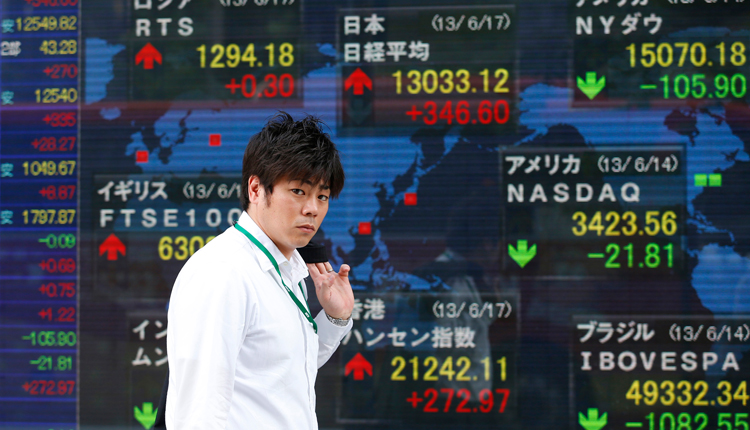Chinese markets extended their gains from the previous session during Tuesday trade, as investors sought clarity on the U.S.-China trade front a day after U.S. President Donald Trump postponed a closely watched tariff deadline in early March.
In a volatile session Tuesday, mainland Chinese stocks recovered from earlier losses to see gains by the end of the morning session. The Shanghai composite rose around 0.72 percent while the Shenzhen component advanced 0.530 percent. The Shenzhen composite added 0.606 percent.
The moves came after Chinese stocks saw explosive gains on Monday on the back of optimism on the U.S.-China trade negotiations, which saw the Shanghai composite surge more than 5 percent into bull market territory.
US-China trade
Analysts expressed caution over the sharp rise in shares seen in China.
“If you look at how China performed relative to the rest of Asia, most Asian markets performed much less, I mean, less than 1 percent gains in most other Asian markets including Hong Kong,” Vasu Menon, OCBC Bank’s vice president of wealth management., told CNBC’s “Street Signs” on Tuesday.
Menon said the large gains could have been a result of retail investors jumping in as well as speculation amid the “euphoria.”
“I’m not saying the China market is frothy. I’m just saying that, you know, what happened yesterday seemed to be a bit … misplaced,” Menon said.
Kathy Lien, managing director of foreign exchange strategy at BK Asset Management, said in a note that “while there will be legs to this rally, its important to understand that a final trade agreement could take many forms.”
“The US could promise to keep tariffs where they are (with no further increases) and review them in a few months / years or they could abolish them completely,” Lien added.
“There’s also a possibility that a deal ‘might not happen at all’ according to Trump but he’s motivated to get it done,” she said.
Asia trading day
Hong Kong’s Hang Seng index fell 0.51 percent.
Elsewhere in Asia, Japan’s Nikkei 225 fell 0.46 percent while the Topix declined 0.41 percent in afternoon trade. Shares of robot maker Fanuc slipped around 1.4 percent
In South Korea, the Kospi fell 0.37 percent as shares of industry heavyweight Samsung Electronics slipped more than 1.2 percent.
Australia’s ASX 200 fell 1.21 percent as the energy sector declined about 0.7 percent. Oil shares Down Under fell after crude dropped more than 3 percent on Monday following a tweet from U.S. President Donald Trump to OPEC that prices were “getting too high.” Santos declined 2.41 percent, Woodside Petroleum slipped 0.43 percent and Beach Energy shed 0.25 percent.
Following Monday’s slump, oil prices declined further Tuesday afternoon during Asian trading hours. The international benchmark Brent crude futures contract slipped 0.39 percent to $64.51 per barrel. U.S. crude futures declined 0.65 percent to $55.12 per barrel.
Over in India, shares declined amid the country’s increased tensions with Pakistan after the latter said Indian military jets had crossed into its airspace in the disputed Kashmir region. The Nifty 50 declined 1.3 percent while the Indian rupee weakened around 0.5 percent to 71.1490 against the U.S. dollar.
The U.S. dollar index, which tracks the greenback against a basket of its peers, was at 96.350 after seeing highs around 96.6 yesterday.
The Japanese yen, considered a safe-haven currency, traded at 110.82 against the dollar after seeing an earlier low of 111.08. The Australian dollar changed hands at $0.7160 after touching an earlier low of $0.7148.
Powell goes to Capitol Hill
Overnight on Wall Street, the Dow Jones Industrial Average rose 60.14 points to close at 26,091.95 while the S&P 500 added 0.1 percent to finish its trading day at 2,796.11. The Nasdaq Composite rose 0.36 percent to close at 7,554.46.
U.S. Federal Reserve Chairman Jerome Powell is headed to Capitol Hill later todayto testify before Congress.
Market participants are looking for clues on the Fed’s next moves during Powell’s appearance, when he will provide prepared remarks followed by question-and-answer sessions.
They will be looking for: a commitment to a go-slow approach to future rate hikes, an acknowledgement of the challenges balance sheet reduction poses, and the economic outlook in view of renewed chatter from Fed executives about the weak pace of inflation amid a global growth slowdown.
“We do not expect Powell to rule out further rate hikes, though we expect him to suggest higher than expected inflation would be needed to re‑start hikes,” Joseph Capurso, senior currency strategist at Commonwealth Bank of Australia, said in a morning note.
“We also expect Powell to confirm the FOMC will announce a plan to stabilise their balance sheet in coming months. We do not expect Powell’s comments to induce a large reaction by the (dollar),” Capurso said.
Source: CNBC
